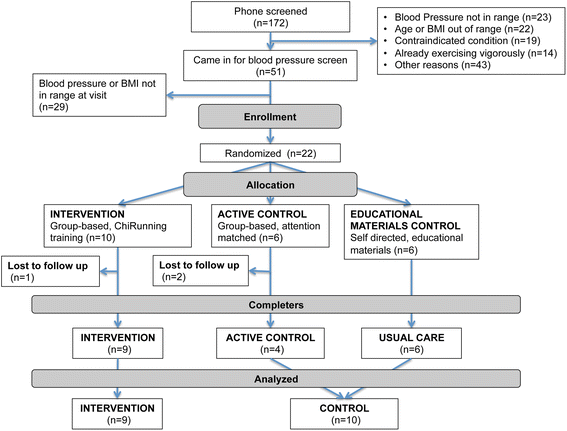Training in ChiRunning to reduce blood pressure: a randomized controlled pilot study
- PMID: 26471194
- PMCID: PMC4608185
- DOI: 10.1186/s12906-015-0895-x
Training in ChiRunning to reduce blood pressure: a randomized controlled pilot study
Abstract
Background: People with prehypertension (120-130/80-90 mmHg) are at increased risk of progressing to hypertension. Recommendations for prehypertension include engaging in regular physical activity. We aimed to assess feasibility and acceptability and collect preliminary outcome data on ChiRunning for people with elevated blood pressure. ChiRunning is a commercially available running program based on the mindful movements of Tai Chi, which is aimed at decreasing injury by both increasing body awareness and modifying running form.
Methods: We enrolled adults with elevated systolic (130-150 mmHg) or diastolic (80-100 mmHg) blood pressure in a 12-week pilot trial. Participants were randomized 2:1:1 to 8 weeks of: 1) intervention-a trainer-led ChiRunning group (n = 10); 2) active control-a trainer-led running group (n = 6); or 3) educational control-a self-directed running group (n = 6) and followed for 4 more weeks. The active control and educational control groups were combined for analysis.
Results: This study was feasible, meeting recruitment, retention and adherence goals, and acceptable to participants. Systolic and diastolic blood pressure did not change significantly over the study for either the ChiRunning or control groups. Changes in BMI over time were significantly different from zero in the ChiRunning group (p = 0.04) but not in the control group (slope for ChiRunning -0.05 [-0.1 to -0.002] vs. control -0.01 [-0.06 to 0.04], between slope difference, p = 0.22). Self-reported running-related injury (i.e. discomfort leading to a decrease in running) was similar between groups (ChiRunning, 4 [1.2 to 8.4] vs. control, 3 [0.7 to 7.1] injuries per 100 h of running, p = 0.72) although self-reported running-related discomfort (i.e. discomfort that does not lead to changes in running) trended higher in the ChiRunning group (ChiRunning, 10 [5.4 to 16.8] vs. control, 4 [1.5 to 9] reports of discomfort per 100 h of running, p = 0.06).
Conclusion: ChiRunning appears to be a feasible and acceptable exercise program for people with elevated blood pressure. We did not find that ChiRunning had a significant impact on blood pressure or self reported injury, but did see a positive change in BMI over time. ChiRunning warrants further investigation in a larger trial.
Trial registration: ClinicalTrials.gov Identifier: NCT01587183.
Similar articles
-
Effects of Form-Focused Training on Running Biomechanics: A Pilot Randomized Trial in Untrained Individuals.PM R. 2015 Aug;7(8):814-822. doi: 10.1016/j.pmrj.2015.01.010. Epub 2015 Jan 26. PM R. 2015. PMID: 25633634 Free PMC article. Clinical Trial.
-
Tai Chi in Chinese adults with metabolic syndrome: A pilot randomized controlled trial.Complement Ther Med. 2019 Oct;46:54-61. doi: 10.1016/j.ctim.2019.07.008. Epub 2019 Jul 22. Complement Ther Med. 2019. PMID: 31519288 Clinical Trial.
-
Effect of Tai Chi versus aerobic exercise on blood pressure in prehypertension patients (TCOBPP): a study protocol for a 12-month single-blind randomized controlled trial.Trials. 2022 Dec 12;23(1):1001. doi: 10.1186/s13063-022-06840-6. Trials. 2022. PMID: 36510218 Free PMC article.
-
Auricular acupuncture for prehypertension and stage 1 hypertension: study protocol for a pilot multicentre randomised controlled trial.Trials. 2013 Sep 22;14:303. doi: 10.1186/1745-6215-14-303. Trials. 2013. PMID: 24053577 Free PMC article. Clinical Trial.
-
Effects of Tai Chi on essential hypertension and related risk factors: A meta-analysis of randomized controlled trials.J Rehabil Med. 2020 May 11;52(5):jrm00057. doi: 10.2340/16501977-2683. J Rehabil Med. 2020. PMID: 32338292
Cited by
-
Efficacy of Tai Chi and qigong for the prevention of stroke and stroke risk factors: A systematic review with meta-analysis.Medicine (Baltimore). 2017 Nov;96(45):e8517. doi: 10.1097/MD.0000000000008517. Medicine (Baltimore). 2017. PMID: 29137055 Free PMC article.
-
Differentiating attention styles and regulatory aspects of self-reported interoceptive sensibility.Philos Trans R Soc Lond B Biol Sci. 2016 Nov 19;371(1708):20160013. doi: 10.1098/rstb.2016.0013. Epub 2016 Oct 10. Philos Trans R Soc Lond B Biol Sci. 2016. PMID: 28080970 Free PMC article. Review.
-
Tai Chi training as a primary care plan for the prevention and management of hypertension: an opinion and positioning article.Ann Med. 2024 Dec;56(1):2320863. doi: 10.1080/07853890.2024.2320863. Epub 2024 Feb 19. Ann Med. 2024. PMID: 38373214 Free PMC article.
-
Effects of forest bathing on pre-hypertensive and hypertensive adults: a review of the literature.Environ Health Prev Med. 2020 Jun 22;25(1):23. doi: 10.1186/s12199-020-00856-7. Environ Health Prev Med. 2020. PMID: 32571202 Free PMC article. Review.
References
Publication types
MeSH terms
Associated data
Grants and funding
LinkOut - more resources
Full Text Sources
Other Literature Sources
Medical


